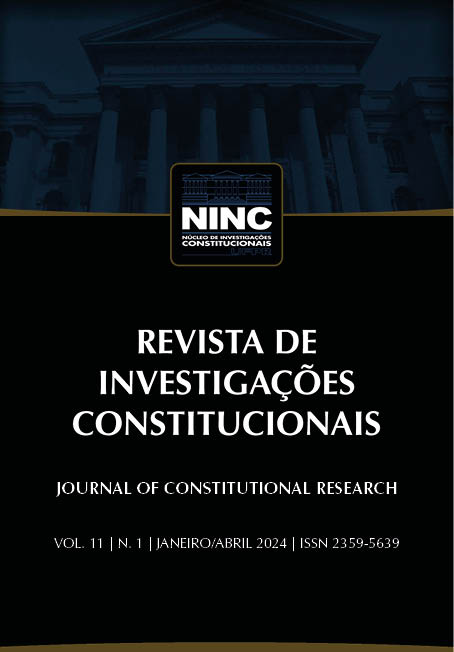Bases para uma justiça eleitoral
DOI:
https://doi.org/10.5380/rinc.v11i1.91816Palavras-chave:
direitos humanos, democracia, sistemas eleitorais, eleições, justiça eleitoral.Resumo
O presente artigo é resultado de uma análise comparada entre as diversas espécies de sistemas eleitorais, com o fim de estabelecer as bases para uma justiça eleitoral. São estudadas as principais características de sistemas eleitorais, no que diz respeito às suas funções normativas, executivas e jurisdicionais, bem como a independência e autonomia entre elas; à sua alocação em uma das três esferas de poder estatal; ao recrutamento, à carreira e às prerrogativas dos membros que a integram; e aos princípios fundamentais e diretrizes que orientam suas decisões. O objeto da pesquisa contempla direitos nacionais representativos de sistemas jurídicos de influência do common law e do civil law e, com lastro em normas internacionais, a justiça eleitoral é situada como uma instituição indispensável para a salvaguarda de direitos fundamentais, sob a ótica dos direitos humanos. De modo qualitativo, com suporte legislativo e doutrinário, enseja-se uma exposição e a reflexão sobre as conformações da justiça eleitoral, seus estândares mínimos e o papel que ela desempenha na manutenção de uma democracia.
Referências
ACEMOGLU, Daron; ROBINSON, James A.; TORVIL, Ragnar. Why do voters dismantle checks and balances?. The Review of Economic Studies, Oxford, v. 80, n. 3, p. 845-875, Jul. 2013.
BLANKE, Hermann-Josef. Scope and aim of a general regulation on access to public information. In: BLANKE, Hermann-Josef; PERLINGEIRO, Ricardo. The right of access to public information: an international comparative legal survey. Berlim: Springer-Verlaf, 2018. p. 131-188.
BLANKE, Hermann-Josef; PERLINGEIRO, Ricardo. Essentials of the right of access to public information: an introduction. In: BLANKE, Hermann-Josef; PERLINGEIRO, Ricardo. The right of access to public information: an international comparative legal survey. Berlim: Springer-Verlaf, 2018. p. 1-68.
BRENES VILLALOBOS, Luis Diego. El rol político del juez electoral: Modelo teórico y explicativo. San José, Costa Rica: Instituto de Formación y Estudios en Democracia (IFED), 2012.
BURGOA, Ignacio. Dicionario de derecho constitucional, garantias y amparo. 29 ed. México: Editorial Porrúa, 1989.
CANTÚ, Hugo A. Concha; OTAOLA, Miguel Ángel Lara; OROZCO Jesús. Towards a global index of electoral justice. International IDEA Discusion Paper 2/2020. Estocolmo: International IDEA, 2020.
CHEESEMAN, Nic; ELKLIT, Jørgen. Understanding and assessing electoral commission independence: a new framework. Londres: Westminster Foundation for Democracy, 2020.
COMMONWEALTH LEGAL EDUCATION ASSOCIATION. Latimer House Guidance on Parliamentary Supremacy and Judicial Independence. Commonwealth principles. Ocho Rios: Latimer House Conference Centre, 1998.
GOMAR, Salvador Olimpo N. Electoral disputes in practice – The mexican experience. In: COUNCIL OF EUROPE. Supervising electoral processes. Science and technique of democracy. N. 48. Estrasburgo: Council of Europe Publishing, 2010. p. 41-56. (Venice Commission’s Science and technique of democracy collection).
HAM, Carolien van; GARNETT, Holly Ann. Building impartial electoral management? Institutional design, independence and electoral integrity. International Political Science Review. Especial Issue: Building Better Elections: Electoral Management and Electoral Integrity, UK, v. 40, n. 3, p. 313-334, Jun. 2019.
HARIOU, Maurice. Precis elementaire de droit constitutionnel. Paris, Recueil Sirey, 1938.
HARTLYN, Jonathan; McCOY, Jennifer; MUSTILLO, Thomas. M. Electoral governance matters. Comparative Political Studies, [S.l.], v. 41, n. 1, p. 73-98 2008.
HEDLING, Nora. A practical guide to constitution building: The design of the judicial branch. In: BÖCKENFÖRDE, Markus; HEDLING, Nora; WAHIU, Winluck. A practical guide to constitution building. Estocolmo: International IDEA, 2011. p. 223-286.
INTERNATIONAL INSTITUTE FOR DEMOCRACY AND ELECTORAL ASSISTANCE. Electoral Justice: an overview of the international IDEA Handbook. Estocolmo: International IDEA, 2010.
INTERNATIONAL INSTITUTE FOR DEMOCRACY AND ELECTORAL ASSISTANCE. Electoral system design: an overview of the new International IDEA handbook. Estocolmo: International IDEA, 2005.
INTERNATIONAL INSTITUTE FOR DEMOCRACY AND ELECTORAL ASSISTANCE. Electoral system design: the new International IDEA handbook. Handbook Series. Estocolmo: International IDEA, 2008.
INTERNATIONAL INSTITUTE FOR DEMOCRACY AND ELECTORAL ASSISTANCE. Electoral justice: The International IDEA Handbook. Estocolmo: International IDEA, 2010b.
INTERNATIONAL INSTITUTE FOR DEMOCRACY AND ELECTORAL ASSISTANCE. International electoral standards. Guidelines for reviewing the legal framework of elections. Suécia: Bulls Tryckeri, 2002.
JOSEPH, Oliver. Independence in electoral management: Electoral processes primer. Estocolmo: International IDEA, 2021.
KANAAN, Alice; RAMOS, André de Carvalho; CAZARRÉ, Carlos Augusto da Silva; et. al. Temas do direito eleitoral no século XXI. Brasília: Escola Superior do Ministério Público da União, 2012.
LEGAL Framework. ACE project, [S.l.], 2012. Disponível em: https://aceproject.org/ace-en/topics/lf/lfb12/lfb12a/lfb12a02. Acesso em: 09 set. 2022.
LEHOUCQ, Fabrice E. Institutionalizing democracy: constraint and ambition in the politics of electoral reform. Comparative Politics, Nova Iorque, v. 32, n. 4, p. 459-477, Jul. 2000.
LOPEZ-PINTOR, Rafael. Electoral management bodies as institutions of governance. Nova Iorque: Bureau for Development Policy United Nations Development Programme, 2000.
LÓPEZ-PINTOR, Rafael. Principles for independent and sustainable electoral management: International Standards for Electoral Management Bodies. Global comparative experiences. Cairo, apr. 2012. New York: UNDP, 2015. Disponível em: https://www.ec-undp-electoralassistance.org/wp-content/uploads/2018/08/undp-contents-publications-principles-for-independent-and-sustainable-electoral-management-English.pdf . Acesso em: 14 set. 2022.
MANIN, Bernard; PRZEWORSKY, Adam; STOKES, Susan. Democracy, accountability and representation. Cambridge: Cambridge University Press, 1999.
McLOUGHLIN, Frank. Prioritizing justice. Estocolmo: International IDEA, 2016.
MERINO, Mauricio; BAÑOS, Marco Antonio. El servicio electoral profesional. In: NOHLEN, Dieter et al. (comps.). Tratado de derecho electoral comparado de América Latina. 2. ed. México: FCE, 2007. p. 437-462.
MERLOE, Patrick. Promoting legal frameworks for democratic elections. Washington: National Democratic Institute for International Affairs (NDI), 2008.
MOZAFFAR, Shaheen; SCHEDLER, Andreas. The comparative study of electoral governance - Introduction. International Political Science Review, [S.l.], v. 23, n. 1, p. 5-27, 2002.
NAVATTA, Carlos A. Urruty. Uruguay: Resolución de los conflictos electorales. In: OROZCO HENRÍQUEZ, Jesus (coord.). Sistemas de justicia electoral: evaluación y perspectivas. México: IFE, 2001. p. 275-288.
NOHLEN, Dieter, et al. (comps.). Tratado de derecho electoral comparado de América Latina. 2. ed. México: FCE, 2007.
NORRIS, Pippa. Transparency in electoral governance. In: NORRIS, Pippa; NAI, Alessandro (eds.). Election Watchdogs. Nova Iorque: Oxford University Press, 2017. p. 3-29.
OROZCO, Jesús. El contencioso electoral, la calificación electoral. In: HOHLEN, Dieter et al. (comps.). Tratado de derecho electoral comparado de América Latina. 2. ed. México: FCE, 2007. p. 1152-1288.
OROZCO, Jesús; WOLDENBERG, José. Ética y responsabilidad en el proceso electoral. In: NOHLEN, Dieter et al. (comps.). Tratado de derecho electoral comparado de América Latina. 2. ed. México: FCE, 2007. p. 60-83.
OTAOLA, Miguel Angel Lara; CASTAÑEDA, Frida Lima; ALMANZA, Maite Zinser. Acceso a la justicia electoral en perspectiva comparada: Garantizar la defensa y protección de los derechos electorales de grupos subrepresentados en México. Estocolmo: International IDEA, 2019.
PERERA, Francisco Javier Barreiro. Garantías de los órganos encargados de la administración de justicia electoral federal en México. In: OROZCO HENRÍQUEZ, Jesus (coord.). Sistemas de justicia electoral: evaluación y perspectivas. México: IFE, 2001. p. 405-430.
PERLINGEIRO, Ricardo; LIANI, Milena; DÍAZ, Ivonne. Principles of the right of access to information in Latin America. In: BLANKE, Hermann-Josef; PERLINGEIRO, Ricardo. The right of access to public information: an international comparative legal survey. Berlim: Springer-Verlaf, 2018. p. 71-130.
PICADO LÉON, Hugo. Diseño y transformaciones de la gobernanza electoral en Costa Rica. América Latina Hoy – Revista de Ciencias Sociales, [S.l], v. 51, p. 95-116, 2009.
RIVERA, Flavio Galván. El principio de legalidad en materia electoral. In: Tendencias contemporáneas del derecho electoral en el Mundo. II Congreso Internacional de Derecho Electoral. México: UNAM, 1993. p. 677-701.
ROMANO, Andrea. Constitutional Courts Dealing with Electoral Systems: a Comparative Look at Constitutional Adjudication on Electoral Equality. Revista de Investigações Constitucionais, Curitiba, vol. 10, n. 2, e232, maio/ago. 2023.
ROSALES, Carlos Manuel. Principios rectores en materia electoral en Latinoamérica. Revista IIDH, [S.l.], v. 49, p. 265-307, 2009.
STEVEN, H. Huefner. Remedying election wrongs. Harv. J. on Legis, [S.l.], v. 44, p. 265-325, 2007.
TAPOKO, Guy Cyrille. Election observation and the question of state sovereignty in Africa. Journal of African Elections, [S.l.], v. 16, n. 1, p. 46-71, 2017.
TOKAJI, Daniel P. Judicial activism and passivism in election law. In: TOKAJI, Daniel P.; HAYWARD, Allison R. The role of judges in electoral law. University of Pennsylvania Law Review, [S.l.], v. 159, p. 273-292, 2011.
TORRES, Luis Eduardo Medina; DÍAZ, Edwin Cuitláhuac Ramírez. Electoral governance: more than just electoral administration. Mexican Law Review, México, v. 8, n. 1, p. 33- 46, 2015.
TRIBUNAL FEDERAL ELECTORAL. Justicia Electoral: revista del Tribunal Electoral del Poder Judicial de la Federación, México, v. 1, n. 1, 1992.
VICKERY, Chad (ed.). Guidelines for understanding, adjudicating, and resolving disputes in elections (GUARDE). EUA: International Foundation for Electoral Systems (IFES), 2011.
VILLEGAS, Mauricio Garcia et al. Constitución, democracia y derechos: textos escogidos de Juan Fernando Jaramillo Pérez. Bogotá: Centro de Estudios de Derecho, Justicia y Sociedad, 2016.
Downloads
Publicado
Como Citar
Edição
Seção
Licença
Copyright (c) 2024 Ricardo Perlingeiro, Camila Pavi

Este trabalho está licenciado sob uma licença Creative Commons Attribution 4.0 International License. Autores que publicam nesta revista concordam com os seguintes termos:
- Autores mantém os direitos autorais e concedem à revista o direito de primeira publicação, com o trabalho simultaneamente licenciado sob a Creative Commons - Atribuição 4.0 Internacional que permite o compartilhamento do trabalho com reconhecimento da autoria e publicação inicial nesta revista.
- Autores têm autorização para assumir contratos adicionais separadamente, para distribuição não-exclusiva da versão do trabalho publicada nesta revista (ex.: publicar em repositório institucional ou como capítulo de livro), com reconhecimento de autoria e publicação inicial nesta revista.
- Autores têm permissão e são estimulados a publicar e distribuir seu trabalho online (ex.: em repositórios institucionais ou na sua página pessoal) a qualquer ponto antes ou durante o processo editorial, já que isso pode gerar alterações produtivas, bem como aumentar o impacto e a citação do trabalho publicado (Veja O Efeito do Acesso Livre).
























